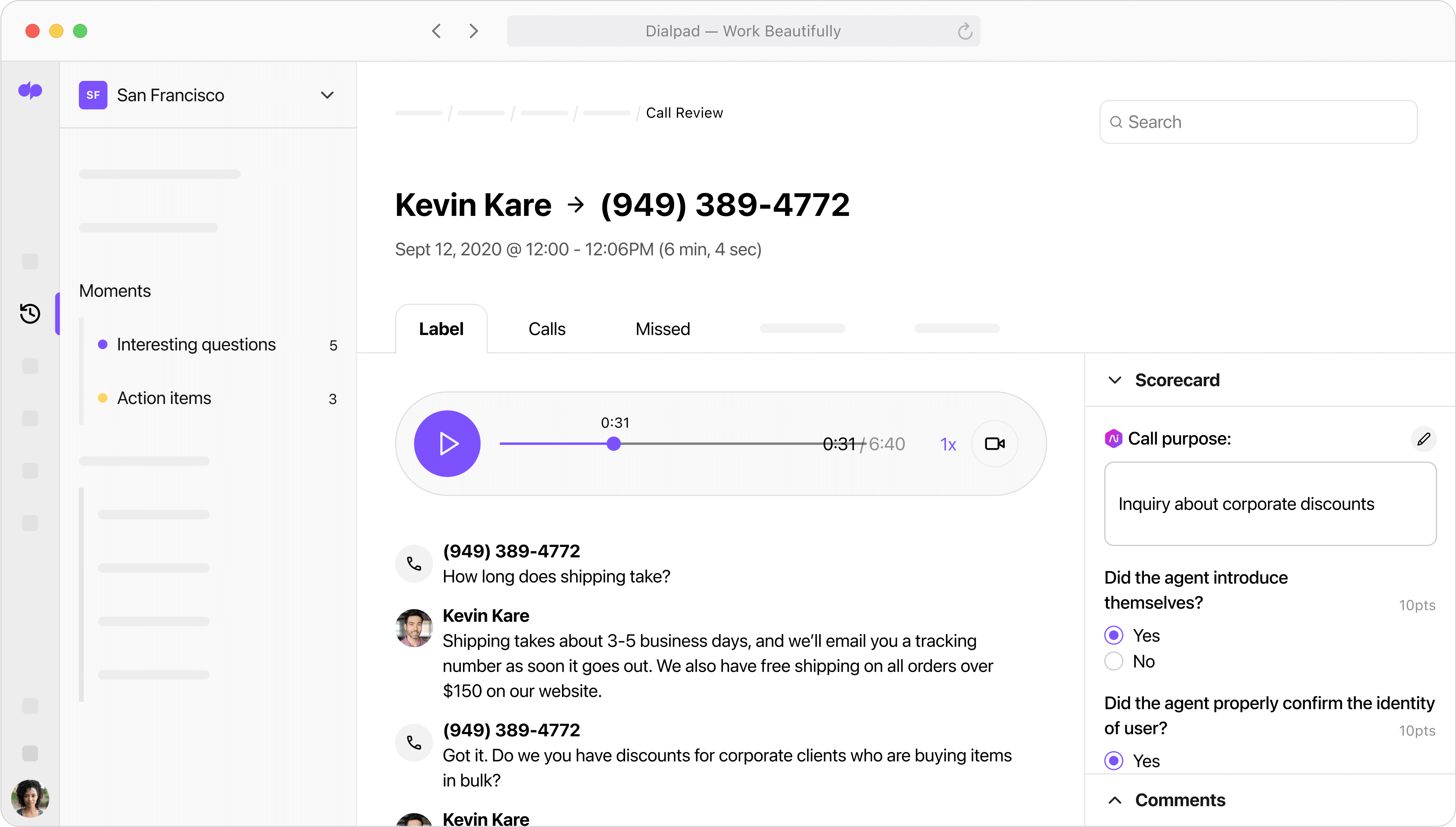The essential guide to the 10 best AI customer service software you just can’t ignore in 2025

Senior Content Marketing Manager

Tags
Share
From transcribing customer conversations to helping with QA and coaching, businesses are increasingly turning to AI customer service software to streamline operations, shorten response times, and improve customer satisfaction.
But what are the best tools out there? In this comprehensive guide, we’ll look at the best AI customer service software out there, what to expect when it comes to AI-powered features, and how to leverage these tools to empower your agents and coaches to provide an amazing customer experience.
What is AI in customer service?
AI in customer service encompasses a range of technologies and tools designed to automate and optimize customer support tasks.
What are AI tools for customer service?
AI tools for customer service are tools that help with everything from automating customer conversations to analyzing sentiment to predictive analytics. Some AI solutions focus on reducing response times while others might help agents handle live customer calls more effectively.
What are key features of AI tools for customer service?
AI tools for customer service vary pretty widely in terms of their use cases, and will come with different features depending on what they’re used for. Here are a few examples of key features you’ll see in many of these AI tools:
1. Natural language processing (NLP)
NLP in customer service is a type of AI technology that allows computers to process and understand human language in customer conversations. Almost all AI transcription tools will use NLP.
2. Chatbots and virtual assistants
Chatbots and conversational AI for customer service provide instant, automated customer interactions and support. Unlike traditional customer service chatbots that would provide preset multiple choice answers to preset questions, AI chatbots can respond to a much wider variety of questions and prompts, which makes for a better customer experience:

3. Automated ticketing and routing
Some AI tools have automated ticketing and routing features, which speeds up issue resolution by categorizing and directing inquiries to the right agents and teams, instead of waiting for someone to manually route tickets.
4. Sentiment analysis
One of the most important types of AI customer service software is the kind that has customer sentiment analysis features, which analyze conversations (usually in real time) for emotional keywords and phrases to quickly flag any customer calls that are headed into negative sentiment territory. This helps busy contact center managers instantly see where their help might be needed:

Why does AI customer service software matter?
AI customer service software is crucial because it empowers businesses to deliver timely, accurate, and personalized support—at scale. With agent turnover rates being among the highest across industries, AI can help speed up onboarding, improve coaching, and deflect low-value and repetitive questions to allow agents to be upskilled.
From a customer perspective, AI-powered customer service software also reduces wait times and makes it possible for customers to get answers to questions 24/7, creating a better experience.
What are the benefits of AI customer service software?
AI customer service software offers a range of benefits that can significantly enhance operational efficiency, customer satisfaction, and overall business performance. Here are a few of them:
Faster response times
AI automates routine tasks such as answering common queries, routing tickets, and scheduling appointments, which means customers who need this type of help can get answers instantly and also human agents can get to more complex questions sooner.
24/7 availability
AI-powered chatbots and virtual assistants can provide round-the-clock support for customers, which is especially important if you have customers in different time zones around the world.
Personalization
AI helps agents provide more personalized interactions by instantly analyzing past customer data and preferences and offering tailored recommendations.
Cost savings
A huge benefit of AI is that it reduces operational costs associated with customer service like training and onboarding, since it can automate repetitive tasks and reduce manual work for agents.
Scalability
AI also makes it easier to scale up a business by helping support agents handle fluctuations in customer inquiries and support volumes, which ensures consistent service quality—even during peak periods.
Higher compliance adherence
For customer service teams, maintaining compliance with company policies and industry requirements like HIPAA are vital. AI can help agents hit all their talking points and ensure they’re complying with playbooks at all times, reducing the chances of human error.
Data-driven insights
Finally, AI can help uncover valuable insights from customer interactions and feedback—for example, the most common troubleshooting topics and concerns that customers bring up in conversations. This helps businesses make more informed decisions, improve their customer service, and even identify opportunities for upselling or cross-selling.
The 10 best AI customer service software solutions of 2025
Now, let’s take an in-depth look at the top AI-powered customer service software solutions for 2025.
1. Dialpad Ai Contact Center
Dialpad is the leading AI customer service software that does everything from transcribing calls in real time, to providing post-call recaps, to tracking key topics and even helping with QA reviews:

With AI that’s built directly into an omnichannel contact center platform, Dialpad Ai Contact Center provides customer service teams everything they need to not only talk to customers over the phone and on digital channels, but also manage those relationships effectively.
Key features
Proprietary AI that’s been trained on over six billion minutes of business conversations
Intuitive drag-and-drop AI chatbot widget and functionality
Unlimited voice calls and video calls
Real-time Ai Agent Assists and transcriptions
Customizable IVR and routing
Enterprise-level security and compliance
A wide range of integrations and an open API
24/7 customer support on phone, live chat, and web (along with a detailed online knowledge base)
Pricing
Dialpad Ai Contact Center’s Essentials plan starts at $80 per user per month and includes call recordings, AI transcription, AI keyword tracking, video meetings, call management features, and more
2. Zendesk
Key features
AI-powered chatbots
Email, live chat, voice, and social support channels
Pricing: Zendesk’s Suite Team tier starts at $55 per user per month. What’s important to note is that beyond chatbots, it doesn’t seem to come with AI features such as AI transcription or summaries, and it comes with online customer support only (no phone support).1
3. Genesys
Key features
Digital and voice bots (add-on only)
Agent assist (add-on only)
Provides AI-driven customer service capabilities including chatbots, voice assistants, and predictive analytics for proactive support.
Pricing: Genesys’ plans start at $75 per user per month, with the Cloud 1 plan. This plan is voice only, which means if you need to provide customer service on digital channels, you’ll need to move up to the Cloud 3 plan which starts at $115 per user per month. On top of that, neither of these plans include AI customer service software features such as AI agent assists—you’d need to add the “AI experience” package ($40) on top.2
4. Five9
Key features
Intelligent virtual agent (add-on only)
Agent assist (add-on only)
IVR with speech recognition (add-on only)
Pricing
Five9’s digital and voice-only plans start at $175 per user per month respectively. If you need to provide customer service over both types of channels, you’ll need the Premium plan which starts at $235 per user per month. But even then, you’d need to pay more for their AI customer service features. How much more? You’ll need to ask their Sales team.3
5. Freshdesk Customer Service Suite
Key features
Web, SMS, messaging, email support channels
Generative AI chatbot (add-on only)
AI coaching (add-on only)
AI insights (add-on only)
Pricing
Freshdesk’s plans start at $29 per user per month. Important to note that unlike other options on this list such as Dialpad Ai Contact Center, Freshdesk’s lowest pricing tier—though cheaper—doesn’t include any AI-powered customer service features.4
6. Talkdesk
Key features
Email, chat, social, SMS
AI agent assists (add-on only)
“Customer Experience Analytics,” which includes transcription
Pricing
Like Genesys and Five9’s pricing, Talkdesk’s plans break up voice and digital—if you need one or the other, your plan will start at $85 per user per month. If you need both voice and digital support channels, you’ll have to go up to the CX Cloud Elevate tier, which starts at $115 per user per month. But if you need customer service AI tools, you’ll need to pay for the most expensive plan, which starts at $145 per user per month.5
7. Nice CXone
Key features
AI agent assists
AI routing
AI summarization
Pricing
Nice’s AI features come included in its “CXone Mpower” package, which starts at $249 per user per month, but it also charges you $0.25 per session for the use of its Copilot and Autopilot AI features.6
8. Ada Support
Key features
Web chat, social channels, voice, SMS
AI chatbot
AI agent
for customer support automation, offering personalized interactions and seamless integration with CRM systems.
Pricing
You’ll have to contact Ada’s Sales team for pricing.7
9. Cloudtalk
Key features
AI topic extraction (add-on only)
AI call transcription (add-on only)
AI call summaries (add-on only)
AI sentiment analysis (add-on only)
Pricing
Cloudtalk pricing starts at $25 per user per month, which includes only voice as a support channel. You’ll have to go up the pricing tiers if you need digital channels as well. If you want AI customer service features, that’s another add-on package that costs an additional $19 per user per month (this is early bird pricing, so it will likely go up later).8
10. Aloware
Key features
AI transcription
AI sentiment analysis
AI keyword tracking
Pricing
Aloware’s pricing starts at $30 per user per month with the iPro plan. For unlimited AI features like call analytics and scoring, you’ll need to go up to the $80 plan, but their pricing page isn’t clear on the limitations of the customer service AI tools in the lowest iPro plan so it’s best to talk to their Sales team to get a clear idea of what they’re actually charging.9
How to choose the right AI customer service software for your business
With so many options, how do you decide which one is the best fit for your agents, contact center operations, industry, and so on? Here are the top factors to consider when narrowing down the best AI customer service software for your business.
Business needs and goals: First, clearly define your business needs and goals. Identify the specific metrics you want to improve and overall goals for your customer service team. (For example, if you don’t provide any phone support, you should avoid voice-only pricing plans.)
Feature fit: On a related note, the features and functionalities offered by your chosen AI customer service software should align directly with your business requirements. Every AI tool does different things, so make sure to take your shortlist for a test drive. If your agents need help responding to customer queries, you’ll need natural language processing (NLP) features. If you want to automate conversations on your website, you’ll need an AI chatbot.
Integration capabilities: You likely already have a customer service infrastructure and workflow that includes a CRM system, helpdesk software, communication platforms, and more. Your customer service AI software should ideally consolidate and replace these tools, or integrate with them so that you’re able to sync data between these apps automatically. This makes it easier for agents to manage customer interactions, and avoids silos that can hinder efficiency and data accessibility.
Scalability: Consider the scalability of the AI software to accommodate your business’ growth and handle increasing volumes of customer interactions over time. Is it easy to add 100 agents, or spin up—and remove—a temporary team to support seasonal demand? Good AI software for customer service makes this possible.
Ease of use: User experience plays a critical role in the successful adoption of AI customer service software. If you want your agents and coaches to get the most out of your investment, take the time to evaluate the software to make sure it’s intuitive and easy to navigate. A user-friendly interface reduces training time for agents, minimizes errors, and ultimately, improves productivity.
Cost and ROI: Evaluate the total cost of ownership (TCO) of the AI customer service software, including initial setup costs, licensing fees, ongoing maintenance, and potential training expenses. Compare pricing models, like monthly and annual subscriptions, and by-the-minute billing. Many of the solutions on the list above have slightly different pricing, and even though the initial base price may look low, by the time you add on all the AI features you need, it may end up being comparable to (or more expensive than) an alternative.
How to implement AI customer service software successfully in 6 steps
If you’re switching to an AI solution, here are a few tips to make that transition as smooth as possible.
1. Assess your business needs
Before implementing your new AI customer service software, it's crucial to assess your organization's current customer service landscape and identify specific challenges and goals.
Talk to your customer service managers, agents, and IT personnel to understand pain points and desired outcomes, and clearly outline what you aim to achieve with AI implementation, such as improving response times, enhancing customer satisfaction, or reducing operational costs.
2. Choose the right AI solution for you
There are many options out there, and choosing the right AI solution for your organization requires evaluating options based on your specific business requirements.
For example, ensure your chosen AI solution integrates smoothly with your existing CRM systems, helpdesk software, and other customer service tools to maintain workflow continuity.
3. Ensure you have clean data for AI training
AI algorithms rely on quality data for effective operation and accurate insights. Most tools will allow you to customize the dictionary for your industry’s or business’ jargon, for example.
To ensure data readiness, you might have to do some data cleansing, which involves identifying any inconsistencies, errors, and duplicates within your existing customer data, consolidating data from disparate sources, and so on.
4. Integrate your AI software into your workflows
Start by taking a close look at the customer service workflows that you want to automate or improve with AI.
For example, do you want to do live sentiment analysis or provide live on-call coaching? Or do you want to use AI to speed up the QA and review process? Map these out, and start integrating your AI software into those processes to help agents familiarize themselves with these new tools.
5. Provide training and support
Ongoing support is essential for maximizing the benefits of AI customer service software, so make sure to provide comprehensive training sessions to customer service agents on how to use AI tools effectively, including handling AI-generated insights and escalation procedures.
Give them access to dedicated technical support from the AI software vendor to help them get onboarded quickly and to get continuous guidance as you continue rolling out the AI tool.
6. Monitor and optimize
Establish key performance indicators (KPIs) such as response time, customer satisfaction scores, and resolution rates to measure the ROI of your new AI customer service software.
Do regular reviews, such as by tracking KPIs or getting feedback from customers and internal stakeholders to identify areas for improvement.
Challenges to consider with AI customer service software
Implementing AI for customer experience brings several challenges that businesses must address to ensure successful deployment and operation. Here’s an expanded look at each of these challenges:
Data quality: Good data is key to success when using any AI tool, so address any inconsistencies and inaccuracies in your customer data to prevent the AI from making inaccurate predictions or recommendations.
Customer expectations: While AI does increase efficiency, customers still expect personalized interactions that acknowledge a difficult issue. There should always be mechanisms for human intervention when AI encounters customer interactions that require empathy and understanding.
Privacy and security: Implement robust encryption protocols to protect customer data both in transit and at rest. Adhering to legal requirements and industry standards regarding data privacy, such as GDPR and HIPAA, is just as essential when using AI tools to avoid penalties and maintain trust with customers.
Accuracy and reliability: AI tools tend to get better over time as they learn from your unique data set, which helps them minimize errors and improve performance. Make sure to ask your AI solution’s vendor how its AI algorithms are continuously refined—if they are at all.
Top trends for AI customer service platforms in 2025
As we move further into 2025, several trends are shaping the landscape of AI customer service platforms, reflecting new advancements in the industry.
1. Generative AI growing more and more popular
Generative AI, particularly in the form of natural language generation (NLG), is quickly gaining popularity in AI customer service platforms. NLG enables machines to create human-sounding text based on inputs, which is increasingly used for generating personalized responses, content creation, and even automating complex customer interactions.
This technology is revolutionizing how businesses handle customer queries by enabling chatbots and virtual assistants to provide more natural and contextually relevant responses. For example, AI can generate dynamic responses tailored to customer inquiries, improving engagement and satisfaction levels.
Businesses are also starting to incorporate more AI self-service capabilities, such as generating detailed troubleshooting guides, FAQs, and product recommendations based on customer data and historical interactions.
2. Data security in AI becoming more necessary than ever
Data security remains a top priority for businesses, especially as customer interactions increasingly occur online and through digital channels. AI is playing a crucial role in enhancing data security measures within customer service platforms by helping with QA reviews and live on-call coaching to increase compliance.
3. AI-powered knowledge bases becoming more helpful
AI-powered knowledge bases are increasingly becoming a cornerstone of customer service platforms. Solutions such as Dialpad Ai Contact Center can search knowledge bases and pull information instantly to help customer support agents.
AI-powered knowledge bases can also enable continuous learning and improvement by analyzing user feedback and interactions to refine content and anticipate future customer needs. This proactive approach not only enhances self-service capabilities but also empowers agents with accurate, up-to-date information to resolve inquiries efficiently with less manual maintenance needed.
Deliver faster and more effective support with Dialpad AI customer service solutions
Customer service AI software represents a transformative opportunity for businesses to elevate customer support standards, drive operational efficiencies, and foster long-term customer loyalty.
By leveraging AI technologies strategically and responsibly, businesses can stay ahead in a competitive market while delivering exceptional customer experiences.
Learn why global brands like RE/MAX and Sonny’s Enterprises are using Dialpad’s AI customer service platform.
See Dialpad Ai Contact Center in action
See how Dialpad Ai Contact Center works with a demo. Or, take a self-guided interactive tour of the app!
FAQs about AI customer service software
1zendesk.com/pricing/
2genesys.com/pricing
3five9.com/products/pricing
4freshworks.com/customer-service-suite/pricing/
5talkdesk.com/pricing/
6nice.com/websites/pricing/
7ada.cx/pricing/#pricing-form
8cloudtalk.io/pricing/
9aloware.com/pricing/








